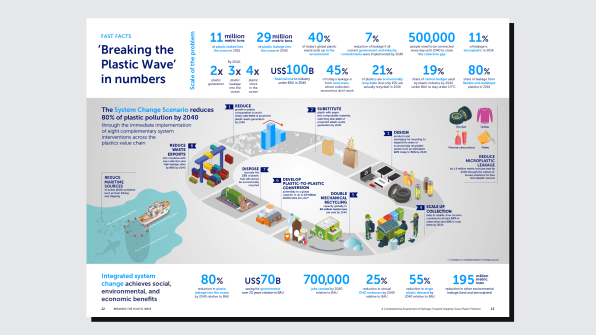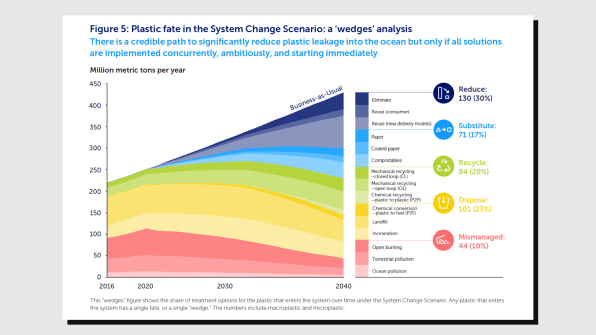Plastic pollution in the ocean is on track to get a lot worse: In two decades, if business continues as usual, there will be nearly three times as much plastic waste leaking into the ocean every year, according to a new analysis. By 2040, since the existing plastic in the ocean isn’t degrading, there could be a cumulative total of 600 million tons of plastic in the water. But solutions exist now to eliminate the vast majority of the new waste.
Plastic pollution is growing for several reasons, says Yoni Shiran, program director at Systemiq, a U.K.-based startup focused on sustainability that partnered with the Pew Charitable Trusts and others, including the plastic-focused Ellen MacArthur Foundation, on the report. As the global population grows, and as consumption grows quickly in many developing countries, people are using more plastic. “We’re also using cheaper plastics,” he says. “And those are just more difficult to recycle. If you take all those trends combined, you get an explosion in the amount of plastic going to the ocean.”

[Image: Systemiq/The Pew Charitable Trusts]
Many large companies have made recent commitments to use more recycled material in packaging, or switch to reusable or compostable alternatives. But company pledges to improve packaging are one piece of a much larger set of solutions that are needed: Even if all existing commitments from businesses and governments move forward, it will only reduce plastic “leakage” to the ocean by 7%, the report finds.And the pledges that do exist, Shiran says, also haven’t gone far enough—only around 20% of brands have signed up to the Ellen MacArthur Foundation’s Global Commitment, and many have made commitments in places such as North America and Europe, rather than in the global south, where the largest volume of plastic is flowing to the ocean. And while many brands have pledged to use more recycled and recyclable material, fewer have actually promised to reduce the total amount of plastic that they use. Companies can also go farther to test and adopt new models for reusable packaging.
The researchers wanted to examine different proposals for tackling the challenge of plastic waste—from plastic bans to ramping up recycling to changing materials or business models—to understand how much solutions could actually help. “What we wanted to do was look at how much different technologies or solutions cost, where are they applicable, and really build global scenarios or strategies that could help us understand what are the different options to deal with ocean plastic,” Shiran says.

[Image: Systemiq/The Pew Charitable Trusts]
Governments need to do more than ban plastic bags. “There are very few countries, if any, that are really taking a robust perspective into plastic,” says Shiran. Policies that require companies to take responsibility for collecting plastic can help put the right incentives in place to change the overall system. Other policies can create a level playing field for new materials. “Obviously plastic has massive subsidies from fossil fuels and from the oil and gas industry,” he says. “It sort of just makes it so difficult for new technologies to compete.” Recycling infrastructure needs to expand and improve.
Right now, the report found, the technical solutions already exist to reduce plastic pollution in 2040 by 80% compared to what it would be if nothing changed. The changes are economically and politically viable. (In the European Union, some are already beginning.) But they must happen now: The report calculates that if the world takes the actions outlined in the report but delays them by just five years, an additional 80 million metric tons of plastic will end up in the ocean by 2040. “The next two years are critical,” Shiran says. As with other sustainability initiatives, he argues that investments to cut plastic waste can help the world build back better in the wake of the pandemic. “It’s a scenario where we have more jobs,” he says. “It’s a scenario where we have less use of materials, less greenhouse gas, and better health implications both for the informal sector in the global south, but also for consumers everywhere in the world.”
(43)